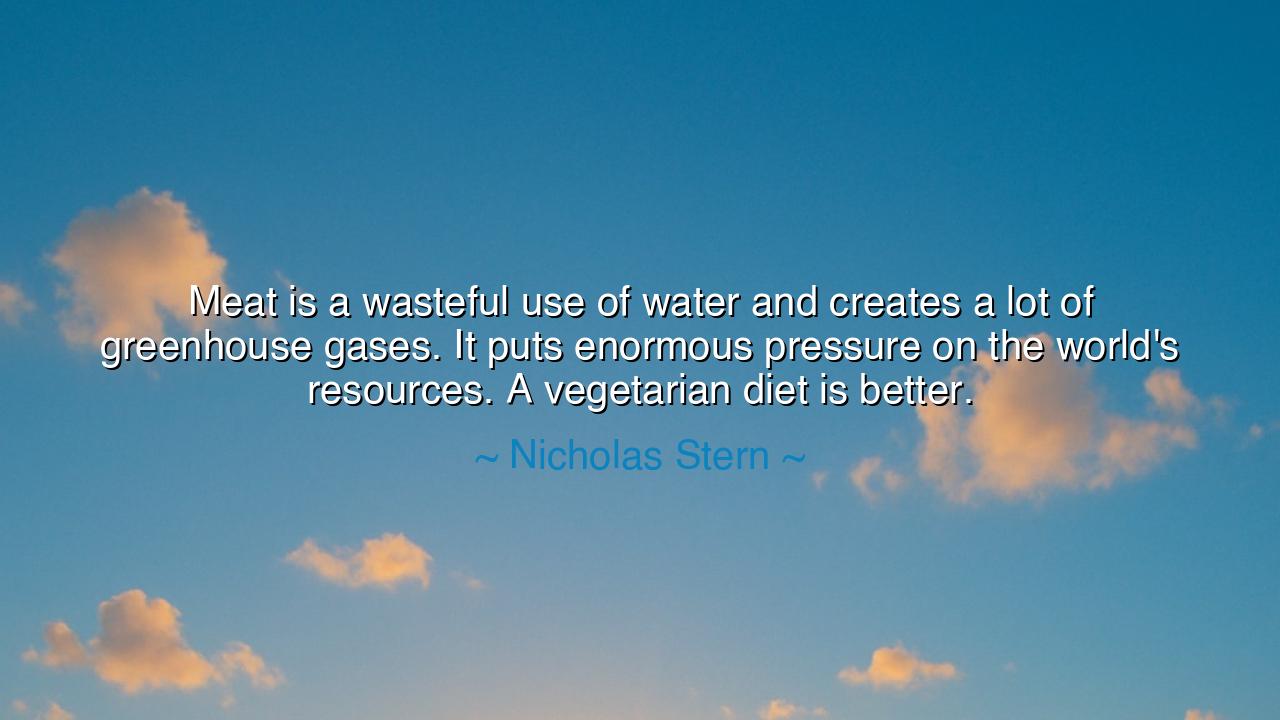
Meat is a wasteful use of water and creates a lot of greenhouse
Meat is a wasteful use of water and creates a lot of greenhouse gases. It puts enormous pressure on the world's resources. A vegetarian diet is better.






When Nicholas Stern proclaimed, “Meat is a wasteful use of water and creates a lot of greenhouse gases. It puts enormous pressure on the world’s resources. A vegetarian diet is better,” he was not merely issuing an environmental warning—he was speaking as a guardian of balance, echoing a truth that the ancients would have understood deeply: that every act of consumption is a covenant with the Earth, and that when this covenant is broken, nature withdraws her grace. His words are both scientific and sacred, a lament for excess and a call to return to harmony with the living world that sustains us.
From the beginning of civilization, the wise have known that abundance carries its own peril. In ancient Greece, the philosopher Pythagoras—himself a vegetarian—taught that all life is bound by a single spirit, and that to consume beyond necessity is to disturb the natural order. Stern’s words stand in that same lineage. For though his reasoning comes from the lens of modern science, his insight springs from a timeless truth: greed drains the well of life. When he calls meat “a wasteful use of water,” he speaks of more than resource scarcity—he speaks of moral scarcity, the emptiness that comes when humankind forgets its duty as steward, not master, of creation.
In the vast fields of the Earth, rivers once clear now run dry, and forests once green stand barren. To feed a single appetite, thousands of gallons of water vanish, and the breath of the planet grows thick with greenhouse gases, the invisible smoke of our excess. The ancients would have seen in this a cosmic imbalance—a defiance of the sacred rhythm that sustains all beings. Just as the great flood in the story of Noah cleansed the arrogance of humankind, so too may the storms and droughts of our age be the Earth’s own warning: that we have taken more than our share.
Stern’s wisdom is not the cry of an ascetic demanding deprivation, but the reasoned call of a philosopher asking for equilibrium. To eat without reverence, to consume without thought, is to betray both the soil and the soul. He does not say that food itself is sin, but that ignorance in eating leads to destruction. The vegetarian diet, in his view, is not merely a personal preference—it is an act of justice toward the planet, a way of restoring what imbalance and indulgence have undone. It is the echo of the old commandment that all wise civilizations have honored: take only what you need, and return gratitude for what you take.
History offers us examples of this wisdom forgotten and relearned. In the fertile crescent of Mesopotamia, once the cradle of abundance, irrigation and overharvesting turned rivers to salt and fields to dust. In the mighty empire of Rome, gluttony and luxury replaced discipline and virtue, until the empire itself grew bloated and fell. The same lesson resounds in our time, but in a different form: the empire of consumption now threatens not one nation, but the whole Earth. Stern, like an oracle of reason, warns us that we may yet share Rome’s fate—unless we learn again to eat with humility and foresight.
Yet within his warning lies hope. For unlike empires that have fallen, humanity today possesses both knowledge and choice. To eat plants instead of meat, to reduce waste, to cherish water as the elixir of life—these are not great sacrifices, but small acts of reverence. They are the modern forms of the ancient virtues: temperance, respect, and wisdom. Each person who chooses such a path becomes a guardian of life, one who heals rather than harms, restores rather than depletes.
And so, the lesson of Nicholas Stern’s words is both moral and practical: our plates are mirrors of our souls. The food we choose determines not only our health, but the fate of the planet. If we eat with arrogance, the Earth will answer with scarcity; if we eat with compassion, she will answer with abundance. Let each meal, then, be an offering, not a conquest. For the wise know that to nourish oneself without harming the world is the highest form of wisdom—and in that harmony lies both health and holiness.






AAdministratorAdministrator
Welcome, honored guests. Please leave a comment, we will respond soon